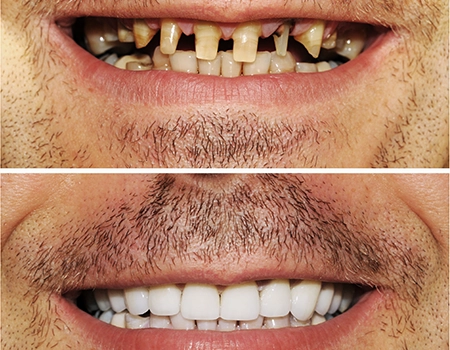Restorative Dentistry In Aurora, IL
Restorative Dentistry
While proper oral hygiene habits can help you maintain a healthy, vibrant smile, sometimes it’s not enough. You may encounter situations that cause your teeth to become damaged or fall out. However, you don’t have to live with these issues.
City of Lights Dental in Aurora offers restorative dental procedures, which can address these issues.

Why Choose City of Lights Dental For Restorative Dentistry Services In Aurora?
There are several reasons you should consider City of Lights Dental for your oral care needs, including:
- Our dental professionals are highly trained and experienced in a wide variety of procedures, including restorative dentistry, which means you’ll receive top-notch care
- We strive to stay up-to-date and employ the latest in dental technology advancements to provide our patients with the most precise diagnoses and treatments
- We understand that every patient is unique and has unique needs and expectations. We work closely with every patient to create a personalized treatment plan
- Our entire staff is compassionate and strives to ensure that every visit is a positive experience
What Is Restorative Dentistry?
Restorative dentistry is an area of dental care focused on restoring functionality and appearance when teeth are damaged and/or missing. These procedures can resolve a variety of issues including tooth decay, damaged teeth, missing teeth, and more. The primary goal of restorative procedures is to restore your teeth to their optimal condition and improve your oral and overall health.


Who is the right candidate for restorative dentistry treatment?
Restorative dentistry is suitable for patients who:
- Are missing one or more teeth
- Wish to improve the appearance and functionality of their smile
- Have damaged/decayed teeth
- Experience pain/discomfort when chewing
Since restorative procedures improve functionality, most dental insurance providers will cover a portion of treatment.
Restorative Dental Service Offered In Aurora
The dental professionals at City of Lights Dental in Aurora have the experience and expertise to perform a variety of restorative dental procedures, including:
Full Mouth Dental Implant
Full-mouth dental implants are a treatment that replaces up to a full set of missing teeth with a combination of dental implants and prosthetics. This procedure offers improved appearance, stability, and functionality for patients who are missing multiple teeth.
Dental Implant
Dental implants are popular among patients who are missing one or more teeth. This solution is both durable and natural-looking, matching your remaining natural teeth to create a seamless appearance.
All-On-4 Dentures
All-on-4 dentures, also known as All-on-4 dental implants, is a solution that combines the stability of dental implants with the affordability of dentures. The denture is permanently attached to 4 dental implants, strategically placed in the jaw- only the dentist can remove it.
Implant-Supported Dentures
Implant-supported dentures also combine the stability of dental implants with the affordability of dentures. The primary difference between these and the All-on-4 system is the number of implants and the fact that these are removable- and still must be removed every night for cleaning.
Dental Bridges
A dental bridge is used to “bridge the gap” between healthy teeth- natural or dental implants- by replacing one or more missing teeth. In the case of a traditional bridge, there is a crown on each end of the device that is placed on the neighboring natural teeth. In some cases, dental implants may be placed on each side of the gap, eliminating the need to alter the natural teeth.
Dentures (full and partial)
Full dentures are designed to replace a full arch of missing teeth, while partial dentures only replace a portion. Traditional dentures are designed to be removed and cleaned every night before bed. This allows you to deep clean your dentures and gives your mouth a chance to rest.
Root Canals and Endodontics
Root canal, also known as endodontic therapy, is a procedure designed to remove the damaged/decayed dental pulp from the tooth. This procedure saves the structure of the natural tooth, which is then restored with a dental filling and crown.
Inlays and Onlays
Inlays and onlays are recommended when the damage is too extensive for a dental filling but not extensive enough to require a crown or extraction. An inlay goes on the chewing surface of the teeth, between the cusps. An onlay extends over the cusps of the tooth.
Scaling and Root Planing
Scaling and root planing are procedures designed to remove plaque and tartar to improve gum health and eliminate gum disease.

Benefits of Restorative Dentistry
Restorative dentistry offers a variety of benefits, including:
- Better oral health: Restorative procedures improve your oral health by preventing further damage/decay
- Boosted confidence: Restorative dentistry improves your confidence by creating a natural, beautiful smile
- Improved functionality: Restorative dental procedures improve your ability to bite/chew properly and speak clearly
- Long-lasting: The improvements provided by restorative procedures are long-lasting- in some cases, the improvements last a lifetime
Restorative Dentistry FAQs
If you have questions about restorative dental procedures at City of Lights Dental, our friendly staff can help. Below are a few of the questions that we get most often about restorative procedures.
Is tooth restoration painful?
Local anesthesia is administered before the procedure, which reduces discomfort during the process. Sedation is an option for patients who struggle with dental anxiety. Post-procedure discomfort can typically be managed with OTC pain relievers. If you’re struggling to manage your discomfort, we will be happy to help.
What is the difference between restorative dentistry and endodontics?
Restorative dentistry is a branch of dentistry designed to address the function and appearance of teeth. Restorative procedures include dental implants, dental crowns, dentures, and more. Endodontics, on the other hand, is more specialized, focused on the inner layer of the tooth, or the dental pulp, where the nerves and blood vessels are located.
How can I restore my damaged teeth?
The best tooth restoration option depends on the type and severity of the damage. Our dentists will evaluate your condition and recommend the best option. In some cases, we may be able to salvage the natural tooth with a filling, dental crown, or inlay/onlay. In some cases, damaged teeth will need to be extracted and replaced with a dental implant or denture.
How long does teeth restoration last?
The longevity of restorative dental procedures varies based on the type of procedure, the materials used, and your personal oral hygiene and lifestyle habits. In many cases, treatments can last for at least several years- if not a lifetime.

